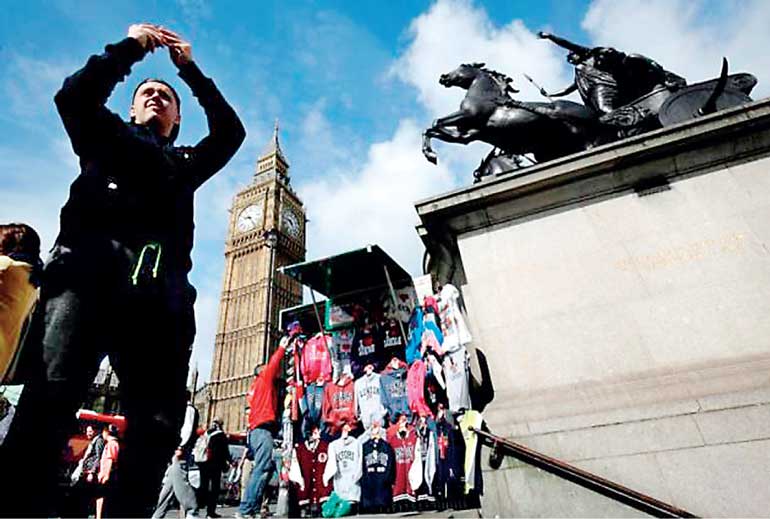Saturday Feb 21, 2026
Saturday Feb 21, 2026
Friday, 1 July 2016 00:00 - - {{hitsCtrl.values.hits}}
 A man takes a picture near the Big Ben clock tower in London, Britain 29 June - REUTERS
A man takes a picture near the Big Ben clock tower in London, Britain 29 June - REUTERS
LONDON/BRUSSELS (Reuters) - European Union leaders met for the first time without Britain on Wednesday less than a week after it voted to leave, delivering a tough message that London can access the bloc’s lucrative single market only if it agrees to allow free movement for EU workers.
Last week’s shock referendum vote to leave the EU has caused global financial market turmoil, sent the pound sterling tumbling and wiped billions off the value of British shares. Britain’s giant financial services sector, roughly 8 percent of economy, relies crucially on access to the EU market.
Prime Minister David Cameron, who campaigned to stay in the EU and lost, has announced his resignation and left it up to his successor to negotiate the terms of Britain’s exit.
But leaders of the victorious Leave campaign have not spelled out in detail what sort of relationship they hope to build with Brussels, creating uncertainty about the future for both Britain and the rest of the bloc.
Cameron, staying on as caretaker until a successor is found, told EU leaders at his final summit with them on Tuesday that he believed the referendum was lost over the principle of unrestricted travel among EU citizens.
But free movement of workers is one of “four freedoms” -- along with movement of capital, goods and services -- that the EU says must be maintained by any country that wants access to its common market. The 27 leaders added a line to their summit statement at the last minute emphasising that principle.
They also called on Britain to trigger the EU’s exit clause by notifying them of its intention to withdraw, which would start a two year clock to negotiate its exit.
“There can be no negotiations of any kind before this notification has taken place,” the statement said. Cameron wants time for his successor to formulate a strategy and sound out European colleagues before beginning the countdown.
Cameron, who had expressed regret and sadness at last week’s referendum result over dinner with his EU peers on Tuesday, told parliament the British economy faced hard times as a result.
“There’s no doubt in my mind these are going to be difficult economic times,” he said.
A senior British lawmaker, Andrew Tyrie, said Britain should not give official notice until a new government had agreed on a negotiating position.
“A crucial task is to identify the maximum level of EU market access, consistent with the need for some control on migration,” he said in a statement on behalf of the influential Treasury Select Committee.
The battle to succeed Cameron as ruling Conservative Party leader is likely to be fought over promises to limit EU migration while still retaining as much access to the common market as possible after Brexit.
One of the candidates to succeed Cameron, Stephen Crabb, said securing control of immigration was essential and acknowledged that might mean less access to the EU market.
Work and pensions minister Crabb ruled out holding another referendum and said his Conservative Party and the country must now unite in focusing on negotiating the best Brexit deal.
“The British people want control of immigration ... For us, this is a red line,” he told a news conference.
Former London mayor Boris Johnson, who led the Leave camp and is bookmakers’ favourite to succeed Cameron, has suggested Britain could have full market access, including for the vital financial sector, without having EU rules enforced by the European Court of Justice or paying as much as London does now into the EU budget. He has also said British citizens would keep rights to live and work in Europe. His critics say his position is unrealistic.
The political turmoil following Britain’s decision to exit the EU has not only triggered a leadership contest in Cameron’s ruling Conservative Party, it also caused lawmakers from the opposition Labour Party to turn on their leader, leftist Jeremy Corbyn, accused of leading a half-hearted campaign to stay in.
Labour lawmakers voted no confidence in Corbyn on Tuesday, but he refused to step down, setting the stage for a bitter fight to push him out. Party rivals want a stronger figure to lead Labour in a general election if the Conservative government falls or parliament is dissolved.
The UK itself could split apart. Voters in Scotland and Northern Ireland voted to stay in the EU, and Scotland’s first minister Nicola Sturgeon has said Scots must not be taken out of the bloc against their will.
Sturgeon visited Brussels on Wednesday to make her case to European leaders to keep Scotland in, hours after Cameron had left. She got a polite hearing but won no commitment, and Prime Minister Mariano Rajoy of Spain, which is concerned about separatism in its own Catalonia region, said Madrid would block direct negotiations with Scotland.
“If the United Kingdom leaves, Scotland leaves,” he said.
EU Commission chief Jean-Claude Juncker agreed to meet Sturgeon, a decision that drew criticism from some EU diplomats who called it a provocation towards London. EU summit chairman Donald Tusk declined to meet her.
German Chancellor Angela Merkel, Europe’s most influential leader, convinced her peers to give Britain time to find its feet and choose a new leader before it starts formal exit talks.
But she too was firm on the price for market access, saying London could not “cherry-pick” the EU benefits it liked.
French President Francois Hollande highlighted the threat to the City of London’s position as the euro zone’s offshore financial centre, saying other European cities should prepare to do clearing in euros once Britain leaves.